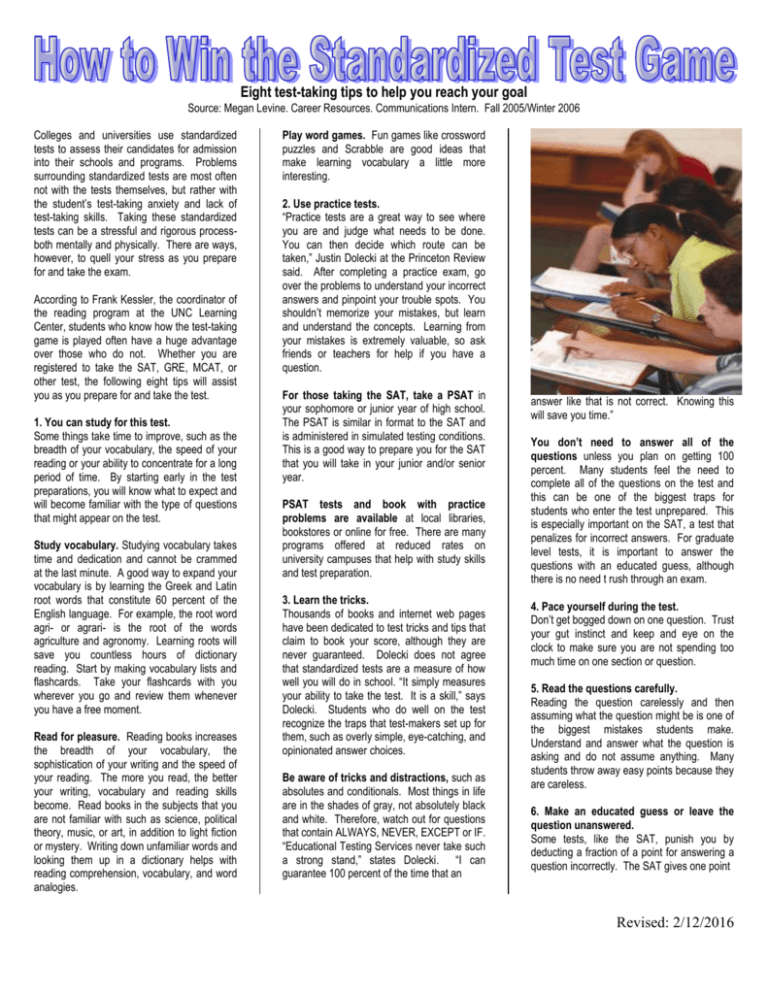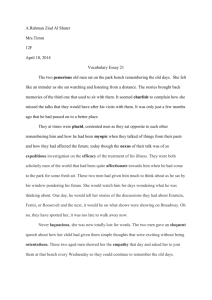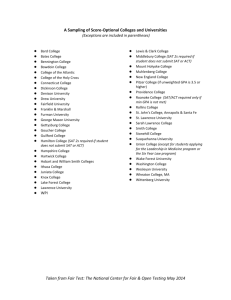How to Win the Standardized Test Game
advertisement

Eight test-taking tips to help you reach your goal Source: Megan Levine. Career Resources. Communications Intern. Fall 2005/Winter 2006 Colleges and universities use standardized tests to assess their candidates for admission into their schools and programs. Problems surrounding standardized tests are most often not with the tests themselves, but rather with the student’s test-taking anxiety and lack of test-taking skills. Taking these standardized tests can be a stressful and rigorous processboth mentally and physically. There are ways, however, to quell your stress as you prepare for and take the exam. According to Frank Kessler, the coordinator of the reading program at the UNC Learning Center, students who know how the test-taking game is played often have a huge advantage over those who do not. Whether you are registered to take the SAT, GRE, MCAT, or other test, the following eight tips will assist you as you prepare for and take the test. 1. You can study for this test. Some things take time to improve, such as the breadth of your vocabulary, the speed of your reading or your ability to concentrate for a long period of time. By starting early in the test preparations, you will know what to expect and will become familiar with the type of questions that might appear on the test. Study vocabulary. Studying vocabulary takes time and dedication and cannot be crammed at the last minute. A good way to expand your vocabulary is by learning the Greek and Latin root words that constitute 60 percent of the English language. For example, the root word agri- or agrari- is the root of the words agriculture and agronomy. Learning roots will save you countless hours of dictionary reading. Start by making vocabulary lists and flashcards. Take your flashcards with you wherever you go and review them whenever you have a free moment. Read for pleasure. Reading books increases the breadth of your vocabulary, the sophistication of your writing and the speed of your reading. The more you read, the better your writing, vocabulary and reading skills become. Read books in the subjects that you are not familiar with such as science, political theory, music, or art, in addition to light fiction or mystery. Writing down unfamiliar words and looking them up in a dictionary helps with reading comprehension, vocabulary, and word analogies. Play word games. Fun games like crossword puzzles and Scrabble are good ideas that make learning vocabulary a little more interesting. 2. Use practice tests. “Practice tests are a great way to see where you are and judge what needs to be done. You can then decide which route can be taken,” Justin Dolecki at the Princeton Review said. After completing a practice exam, go over the problems to understand your incorrect answers and pinpoint your trouble spots. You shouldn’t memorize your mistakes, but learn and understand the concepts. Learning from your mistakes is extremely valuable, so ask friends or teachers for help if you have a question. For those taking the SAT, take a PSAT in your sophomore or junior year of high school. The PSAT is similar in format to the SAT and is administered in simulated testing conditions. This is a good way to prepare you for the SAT that you will take in your junior and/or senior year. PSAT tests and book with practice problems are available at local libraries, bookstores or online for free. There are many programs offered at reduced rates on university campuses that help with study skills and test preparation. 3. Learn the tricks. Thousands of books and internet web pages have been dedicated to test tricks and tips that claim to book your score, although they are never guaranteed. Dolecki does not agree that standardized tests are a measure of how well you will do in school. “It simply measures your ability to take the test. It is a skill,” says Dolecki. Students who do well on the test recognize the traps that test-makers set up for them, such as overly simple, eye-catching, and opinionated answer choices. Be aware of tricks and distractions, such as absolutes and conditionals. Most things in life are in the shades of gray, not absolutely black and white. Therefore, watch out for questions that contain ALWAYS, NEVER, EXCEPT or IF. “Educational Testing Services never take such a strong stand,” states Dolecki. “I can guarantee 100 percent of the time that an answer like that is not correct. Knowing this will save you time.” You don’t need to answer all of the questions unless you plan on getting 100 percent. Many students feel the need to complete all of the questions on the test and this can be one of the biggest traps for students who enter the test unprepared. This is especially important on the SAT, a test that penalizes for incorrect answers. For graduate level tests, it is important to answer the questions with an educated guess, although there is no need t rush through an exam. 4. Pace yourself during the test. Don’t get bogged down on one question. Trust your gut instinct and keep and eye on the clock to make sure you are not spending too much time on one section or question. 5. Read the questions carefully. Reading the question carelessly and then assuming what the question might be is one of the biggest mistakes students make. Understand and answer what the question is asking and do not assume anything. Many students throw away easy points because they are careless. 6. Make an educated guess or leave the question unanswered. Some tests, like the SAT, punish you by deducting a fraction of a point for answering a question incorrectly. The SAT gives one point Revised: 2/12/2016 correctly increases with each answer choice you eliminate, so eliminate as many choices as you can. If you cannot quickly make an educated guess, leave it blank. for each correct answer and zero points for questions left blank. For the SAT, if you are really not sure, leave it blank. Other graduate level tests, like the MCAT or DAT, do not penalize for incorrect answers and, in fact, it is recommended that you answer the question by making an educated guess. Your chance of answering the question 7. Recheck your answer sheet if you have time. Make sure that there are not stray pencil marks or your answer sheet and that you have filled in the answer correctly. If you have circled questions that you were not sure of, go back and rework the problem. Recheck math computations or go over your essay to make sure there are no grammatical or spelling errors. 8. Consider taking a commercial preparation course. Many students today are opting for commercial preparatory classes in the attempt to better their score. With opinions on either side, it really comes down to your individual learning style. Dolecki believes that covering the material on your own could be a challenge. “Classes are good for students who need help with focusing and overcoming certain problems. They might need a teacher to lead them and tell them what they should be studying.” Be aware that these classes have AN answer, not necessarily THE answer. If you become test savvy and learn how the game is played, then you are ready to take on anything these standardized tests throw at you. You’re prepared. You’ve planned. Have confidence in yourself and know that you can achieve your goal. Taking a long exam can cause anxiety and stress that can lead to a lower score. It is important to prepare your body and mind for the rigors of exam day. These tips should assist you in that area. Take care of your body It is important to stay stress free by getting plenty of sleep and exercise before the test is even on the horizon. You do not want to shock your body by doing something different on test day, such as eating something new or waking up at the crack of dawn. Exercise is an important tool to help improve your mental and physical health before the big day. Exercise can be incorporated into your daily life, such as briskly walking to class or taking the stairs instead of the elevator. Sweating out your anxieties by taking a hike or spinning on the stationary bike is a great way to stay stress free. Get plenty of sleep before the exam. A well-rested mind thinks clearly and is less apt to make careless errors. Stay away from unhealthy substances that might affect your health such as alcohol, legal or illegal drugs or excessive amounts of caffeine. It is best to be relaxed, well rested, energized, and prepared. Practice waking up early- You will be better prepared on the test day if you practice waking up at 8 a.m. the week before the exam to work over some practice problems. By doing this, your brain won’t be shocked by the early morning wake-up call on the test day. Eat a healthy breakfast loaded with whole grains, fruit, protein, and low in fat and sugar. Your brain can’t work on an empty stomach, just like your car won’t run without gas. Fuel your brain. Stay away from excessive amounts of caffeine because it might make you anxious or jittery. Bring a healthy snack for your break that will power you through the rest if the test. Pretzels, bananas or granola bars are good snack ideas because they won’t leave you crashing like a sugary snack will. Take care of your brain: managing stress The day before the exam, don’t study. Go to the movies, go bowling, hang out with your friends or watch television and relax. Familiarizing yourself with the test site, arriving early and not studying during breaks will reduce your stress level because you will be better able to focus on the test. Drive to the test site before the exam so that you do not get lost on the test day. Arrive 15-30 minutes early to mentally prepare yourself and get settled in. You will not be able to leave the room while the test is being administered so use the restroom or water fountain at this time. Do not study during the breaks and do not talk to the other students to compare answers. Find a quiet place to decompress and relax before the next part of the test. To reduce stress during the test, breathe in until your lungs can’t hold anymore, quickly take a gasp of air in through your mouth and breathe out slowly and evenly through your nose. Repeat until you feel relaxed. Revised: 2/12/2016








